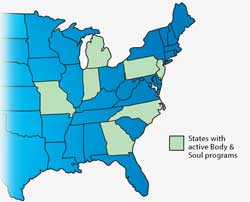Body and Soul Healthy Lifestyle Program
University of North Carolina at Chapel Hill, Prevention Research Center
The majority of Americans (73%) identify themselves as Christians,1 which means that churches may be in a key position to improve the health of the nation. Not only are churches potential points of contact with the public, they also tend to hold regular events that involve food and relationships. Researchers at the University of North Carolina at Chapel Hill and Emory University worked together to develop, test, and distribute Body & Soul, a program that encourages proper nutrition among black church members. See below for a description of the creation, success, growth and future of the program.

The Body & Soul Program encourages healthy food choices through education, church events, and peer counseling.
The Creation of Body and Soul
Body & Soul is a program that incorporates healthy lifestyle education, church events, and peer counseling and has been proven to promote healthy food choices among participants.2 The program was based on the success of two projects that promote healthy nutrition among Black church members. One was called Black Churches United for Better Health and was developed by researchers from the University of North Carolina at Chapel Hill PRC. It involved making environmental changes to churches (such as increased availability of fruits and vegetables at events), gaining the support of church leadership, and distributing educational materials encouraging healthy lifestyles.3 The other program was Eat for Life which emphasized motivational counseling for participants.4
The essential elements of each program were combined to create Body & Soul:
- Pastoral involvement and support.
- Peer counseling for participants.
- Church-wide activities to promote healthy food choices such as:
- Health fair, kick-off event.
- Educational sessions with cooking classes.
- A church environment that promotes healthy food choices such as:
- Fresh fruits and vegetables at general church events.
- Sponsoring a farmer’s market at the church.

The Body & Soul Program promotes increased fruit and vegetable consumption.
The Success of Body and Soul
In order to assess the effectiveness of the Body & Soul program, the development and implementation was funded by the American Cancer Society (ACS) and the evaluation was funded by The National Cancer Institute (NCI). Researchers from the UNC PRC and Emory University recruited 16 African American churches in North Carolina and Georgia and assigned them to either the Body & Soul group or the comparison group. 1,022 participants filled out questionnaires about their diet at the start of the program and 864 of these participants completed the follow-up survey six months later. The fruit and vegetable consumption was the questionnaires’ focus, but the survey also included questions about fat intake, vegetable preparation practices, and social support, motivation, and self-confidence to eat more fruits and vegetables.
The results of the evaluation were positive in every category and showed that that those who received the intervention reported significantly greater consumption of fruits and vegetables. Of those who participated in the program, the majority received all the elements of the program and was very satisfied with the program as a whole.2 In particular, receiving educational materials and attendance at church-wide events had the most significant impact on healthy eating.5

Documented use of the Body & Soul Program
The Growth and Adaptation of Body and Soul
Since these first studies of effectiveness, the American Cancer Society has embraced Body & Soul as one of its national cancer control programs. The program is established in Michigan and Indiana, reaching hundreds of churches.
Body & Soul is included in the National Cancer Institute’s and Substance Abuse and Mental Health Services Administration’s Research Tested Intervention Programs (RTIP), which is a searchable database of current, effective, and peer-reviewed cancer control programs. It is designed to provide program planners and public health practitioners easy and immediate access to RTIP materials free online. Body & Soul scored fairly well on the three review categories: Research Integrity, Intervention Impact, and Dissemination Capability.
Additionally, the Cancer Prevention and Control Research Network, a thematic network of the PRC Program, has been a source of technical assistance and ongoing research. Researchers from the Washington University in St. Louis PRC have been helping churches in Missouri to implement the program,7 and researchers from the Emory University PRC have been doing a similar work in Georgia.8
In 2005, Dr. Marlyn Allicock began research on the peer counselor training component of the Body & Soul program. Dr. Allicock says, “Through the years of working with churches and the Body & Soul program, I have seen the program welcomed with open arms because it enhances the health and spirituality of church members.” She recently completed an assessment of the implementation and dissemination of Body & Soul in North Carolina and Michigan through the University of North Carolina at Chapel Hill PRC and in collaboration with the University of Michigan PRC.9 Dr. Allicock often notes that “Church leaders recognize that obesity and hypertension are high priority problems in their communities, and this program offers a resources and a framework for- helping their members live healthier lifestyles.”
Church members had better access to fruits and vegetables at events; access to educational materials, and motivational counseling.
The Future Health of Body and Soul
The Body & Soul program has been established as spiritually and culturally appropriate for dietary change among African American church members. With the emphasis on incorporating healthy choices in church events, leadership involvement, and peer counseling, this program is well suited to church needs. By increasing the reported amounts of fruits and vegetables eaten, progress may be made toward eliminating health disparities in the United States.
References Cited
- The Pew Forum on Religion and Public Life. Pew Forum Website. http://religions.pewforum.org/. Accessed January 4, 2013.
- Resnicow K, Campbell MK, Carr C, et al. Body and Soul a dietary intervention conducted through African-American churches. American Journal of Preventive Medicine. 2004;27(2):97–105.
- Campbell MK, Motsinger BM, Ingram A, et al. The North Carolina Black Churches United for Better Health Project: Intervention and Process Evaluation. Health Education & Behavior. 2000;27(2):241–253.
- Resnicow K, Jackson A, Wang T, et al. A motivational interviewing intervention to increase fruit and vegetable intake through black churches: results of the eat for life trial. American Journal of Public Health. 2001;91(10):1686–1693.
- Campbell MK, Resnicow K, Carr C, et al. Process evaluation of an effective church-based diet intervention: body & soul. Health Education & Behavior. 2007;34(6):864–880.
- National Cancer Institute Research Tested Intervention Programs Body & Soul website. National Cancer Institute. http://rtips.cancer.gov/rtips/programDetails.do?programId=257161. Accessed January 4, 2013.
- Honeycutt S, Carvalho M, Glanz K, Daniel SD, Kegler MC, et al. Research to reality: a process evaluation of a mini-grants program to disseminate evidence-based nutrition programs to rural churches and worksites. Journal of Public Health Management Practice. 2012;18(5):431–439.
- The National Cancer Institute. The Adaptation Effect: Engaging Community Partners to Adapt and Implement Evidence-based Interventions. National Cancer Institute Website. https://researchtoreality.cancer.gov/cyber-seminars/adaptation-effect-engaging-community-partners-adapt-and-implement-evidence-based-inte. Accessed January 4, 2013.
- Allicock M, Johnson L, Leone L, et al. Promoting fruit and vegetable consumption among members of black churches, Michigan and North Carolina, 2008–2010. Prev Chronic Dis. 2013;10:120161. DOI: http://dx.doi.org/10.5888/pcd10.120161.